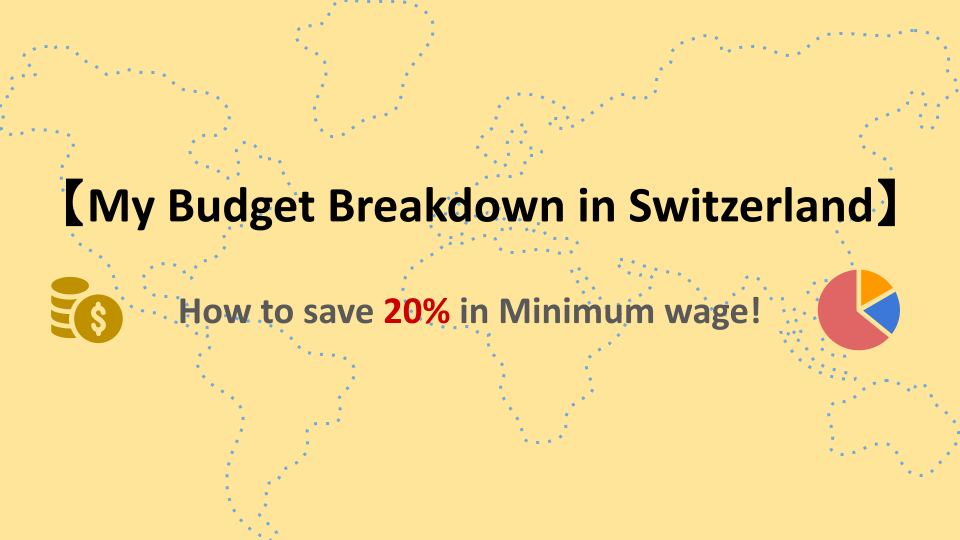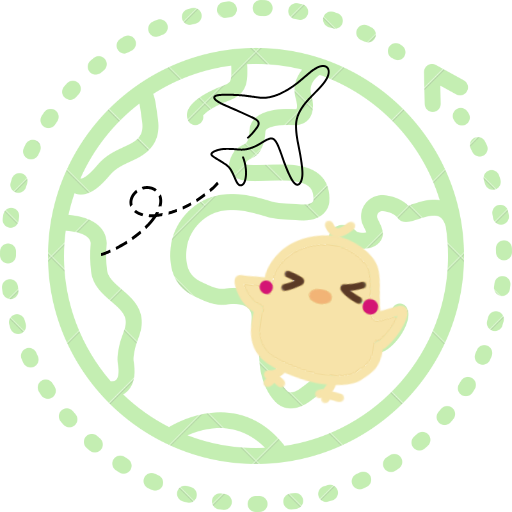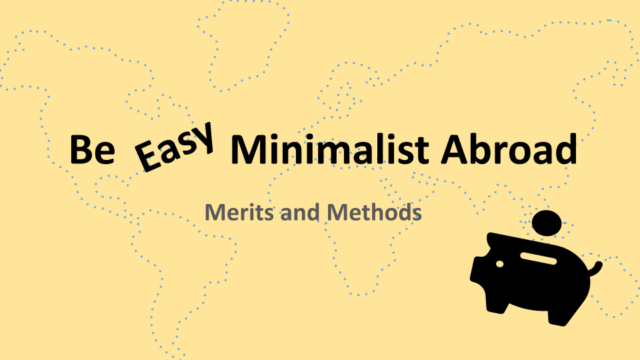How I Save 20% of My Income Even on Minimum Wage 【My Real Budget Breakdown in Switzerland】

This post is 6 minutes read time.
Imagine this: You’re at a train station in Switzerland and spot a familiar golden “M”—McDonald’s! Nostalgia hits. You check the menu, find your favorite meal, and imagine how delicious it was back home. Your mouth waters, the aroma fuels your hunger, and you eagerly proceed to pay.
Then, reality hits. “18 CHF?!”
You panic, thinking it’s a mistake. You check the cart—no extra items, just the one meal. Heart sinking, stomach growling, you leave McDonald’s in shock…
That was me when I first started living in Switzerland.
Switzerland is infamous for its high cost of living, but what is the actual situation? In this post, I will share my real monthly budget and how I comfortably save an average of 20% of my income, even in one of the most expensive countries in the world!💰
Who Am I? Why Should You Trust This?
I am a PhD student living in Geneva, Switzerland. My salary is limited, yet I manage my finances efficiently without compromising my quality of life.
By reading this post, you’ll get:
✅ A real breakdown of living costs in Switzerland
✅ Practical money-saving tips for an expensive country
✅ Insights into how to budget efficiently while still enjoying life
- Monthly Income & Expense Summary
- Breakdown of Major Expenses
- How My Spending Compares to the Swiss Average
1. Average Monthly Income & Expense Summary
💰 Monthly Net Income: 3,256 CHF
This is my take-home pay after taxes. (Note: The tax system for PhD students differs from Swiss citizens.)
💡 Extra Income: The 13th Salary
In Switzerland, employees often receive a 13th salary, split into two payments in June and December. However, I don’t count on it for my budget!
⭐ Rule #1: Always underestimate your income and never rely on bonuses or extra payments!
💸 Average Monthly Expenses: 2,526 CHF
I categorize my expenses into:

For a detailed guide on how I calculate living costs, check out this post:
📊 Here’s my expense breakdown:
| Fixed Cost (CHF) | Variable Cost (CHF) | |||
|---|---|---|---|---|
| Basic Expenses | Rent (Apartment) | 1255 | Food | 200 |
| Mobile Phone | 18 | Utility | 12 | |
| Health Insurance | 65 | Household | 60 | |
| Subscription | 20 | |||
| Financial support | 300 | |||
| *Tuition fee | 11 | |||
| *House Insurance | 10 | |||
| *Tax | 40 | |||
| *Transportation | 35 | |||
| Comfortable Expense | Dining with Friends | 100 | ||
| *Travel | 200 | |||
| Others | 200 | |||
| Fixed Cost Total | 1754 | Variable Cost Total | 772 | |
| Total cost | 2526 CHF | |||
2. Breakdown of Major Expenses

Basic Expenses – Fixed Costs
⭐ Rule #2: Try to minimize fixed costs as much as possible because once you take certain steps, the cost reduction lasts long without any extra effort.
🏠 Rent: 1,255 CHF
- 1.5-room apartment in the city center
- Close to supermarkets, post office, and public transport
- Includes management fees, central heating, and hot water
📱 Mobile Phone: 18 CHF
I use Digital Republic, a contract-free and affordable provider with:
✅ Unlimited 5G data, calls & SMS in Switzerland
✅ 2GB roaming in the EU & USA
💡 Want to know the best mobile plans for expats in Switzerland? Check out my review!
🚆 Public Transport: 35 CHF/month
I use an annual public transport pass (500 CHF/year). My university reimburses 80 CHF, bringing my cost down to 420 CHF/year.
💡 Tip: If you bike or don’t commute daily, you might not need this expense!
🏥 Health Insurance: 61 CHF
Switzerland’s health insurance is insanely expensive, rising 6% in 2025 with an average premium of 378.70 CHF/month.
💡 How I Pay Less:
I use international student insurance with subsidies. If you earn less than 57,471 CHF/year in Geneva, you can apply for Canton subsidies that directly reduce premiums!
🏠 Household & Liability Insurance: 121.99 CHF/year
I switched from Baloise (299 CHF/year) to IKEA insurance (121.99 CHF/year) after turning 30.
💡 Tip: Always check your insurance plan annually!
📺 Subscription Costs: 20 CHF/month
I used to subscribe to multiple services like:
- Netflix (12,90 CHF)
- Amazon Prime (9.99 CHF)
- ChatGPT Plus (20 CHF)
At first, I didn’t notice how much they were adding up, because most services auto-renew and charge you silently in the background.
🚨 But when I checked my expenses, I realized I was spending over 40 CHF per month on services I barely used! 🚨
To cut down costs, I:
✅ Canceled Netflix & Amazon Prime (I wasn’t using them enough)
✅ Kept only ChatGPT Plus (because I use it daily for work & writing)
💡 Lesson: Subscriptions seem small individually, but over time, they add up to hundreds of francs per year! Review them regularly and cancel unused ones!
📺 Taxes (Radio & TV + Personal Tax): 360 CHF/year
Even if you don’t own a TV, you must pay the 335 CHF radio & TV fee. Plus personal tax (25CHF) every year.
🏦 Bank Account Fees: 0 CHF
After 30, UBS started charging 8 CHF/month + 100 CHF/year for a credit card. I switched to Neon (a digital bank) and now pay 0 CHF!
Basic Expenses – Variable Costs
As for variable cost, I don’t put strict budget because I don’t want to feel stress in daily basis about money.
🍽️ Food: Around 200 CHF/month
⭐ My Grocery Rules:
1️⃣ Shop once a week → Frequent trips = more spending!
2️⃣ Buy at Lidl → Cheaper than Migros or Coop
3️⃣ Get meat in France → Much cheaper!
💡 Utilities: Around12 CHF/month
Electricity in Switzerland is cheap. I use minimal electronic devices, so my bill stays low.
Comfortable Expenses
🍽️ Dining Out: 100 CHF/month
I use The Fork app for restaurant discounts of up to 50%!
✈️ Travel: 200 CHF/month
Saving for the future is important, but I also value making the most of my time now, so I allocate money for travel as well. I love surfing, so I make it a priority to go at least once a year.
3. How My Spending Compares to the Swiss Average
To understand whether my expenses are higher or lower than the Swiss average, I compared my spending using official Swiss statistics.
I focused on individuals in a similar situation to mine: single, under 34 years old, and categorized expenses accordingly.
📊 Expense Comparison: My Budget vs. Swiss Average
| Category | My Expense (CHF) | Swiss Average* (CHF) |
|---|---|---|
| Rent (Apartment+Utility) | 1267 | 1294 |
| Communication** | 18 | 113 |
| Health Insurance | 65 | 397 |
| Financial Support | 300 | 36 |
| Taxes*** | 40 | 40 |
| Transportation | 35 | 424 |
| Food | 200 | 326 |
| Household Expenses | 60 | 91 |
| Other Basic expenses | 41 | 207 |
| Dining with Friends | 100 | 309 |
| Other Leisure Activities | 400 | 244 |
| 🔹 Total Expenses | 2526 | 3481 |
*Average expenses for individuals under 34 years old.
**Communication includes both internet and phone costs.
***Taxes cover ‘Tax personnel’ and the ‘Radio and TV tax,’ but do not include income tax (impôt).”
💡 Key Takeaways: How My Expenses Compare
Compared to the Swiss average for a similar household type, my total expenses are 955 CHF lower per month.
However, spending less doesn’t mean sacrificing quality of life. I prioritize what truly matters to me while cutting costs on non-essential or overpriced expenses.
💰 Biggest Savings:
✔ Health Insurance – I use an international student insurance plan, saving me over 330 CHF per month.
✔ Communication – I use a budget-friendly mobile plan, paying only 18 CHF/Month instead of 113 CHF/Month.
✔ Transportation – My annual public transport pass and university subsidy significantly reduce my costs. No car.
🏡 Fixed Cost Optimization Matters!
Once I reduce fixed costs, the savings continue every month—effortlessly! This is why I focus on minimizing recurring expenses first before looking at variable costs like leisure and dining out.
Final Thoughts & Key Takeaways
📌 Yes, Switzerland is expensive, but budgeting smartly makes life enjoyable!
📌 Optimize fixed costs → They stay low without extra effort.
📌 Don’t cut ALL spending → Enjoy life within reason.
Got questions? Let me know in the comments!












Leave a Reply